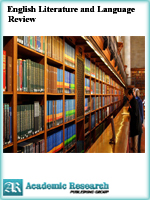English Literature and Language Review
Online ISSN: 2412-1703
Print ISSN: 2413-8827
Print ISSN: 2413-8827
Quarterly Published (4 Issues Per Year)

Archives
Volume 4 Number 6 June 2018
The Impact of Cohesion Shift Levels on Translation Accuracy
Authors: Kammer Tuahman Sipayung ; Syahron Lubis ; Eddy Setia ; Roswita Silalahi
Pages: 93-99
Abstract
This study discuss about the impact of cohesion shift levels on translation accuracy. The aims of this study to find out a) a dominant cohesion shift level, b) the impact of the dominant level on translation accuracy, c) the dominant category changes caused by dominant level, d) the level of cohesion shift which have a positive impact on translation accuracy. This research used descriptive qualitative method to achive the objectives of study. There are two kinds of data in this study, the first is obejctive which consist of 562 data and the second is affective in the form of number (1-3). The objective data was collected through observation and content analysis while the affective data was collected through questionnaire and depth-interview. The result of this research shown that a) cohesion shift in the level of implicitation is dominant (217 shifts), b) implicitatioan influence a negative impact on translation accuracy (2,45), c) the dominant changes of category on implicitation level are phrase become Ø and phrase become phrase (36 shifts), d) cohesion shift in the level of explicitation is a well strategy than the other levels. Translators are able to improve the accuracy of translation by applying cohesion shift in the level of explicitation.
Moroccan Parental Involvements in their Children’s Learning of English Language
Authors: El Hacen, Moulaye Ahmed ; Adiba Bousfiha
Pages: 88-92
Abstract
Almost all Moroccan institutions of education, as others elsewhere, of all levels from primary, secondary to higher, of all sectors, from private to public, of all shapes and sizes, from metropolitan universities to small institutions, are starting to teach English as a second language to students. These students’ learning is influenced by their parents’ involvement in and attitudes toward English language. Such influence is what the current study tires to investigate and evaluate in the Moroccan context. To this end, a quantitative approach was adopted, and 31 questionnaires were distributed on students at Sidi Mohamed Ben Abdellah University. The results showed that parents were strongly involved in their children’s learning of English though with varying degree. Parents with educational background and considerable income accompanied their children through all twists and turns of their learning journey. The less fortunate ones, however, were less engaged when it comes to orienting their children’s specialty choice. It was also found out that most parents recognized the crucial role of English language. The findings revealed also that parents’ support in and positive attitudes toward English language have significantly facilitated and contributed to the academic achievement of the students.



